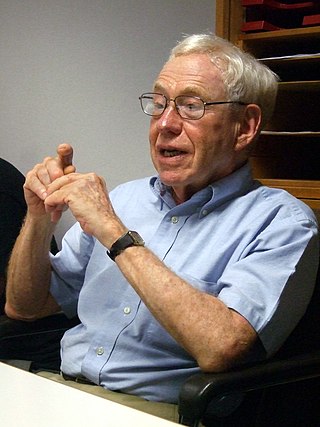Artificial mind can refer to :
- Artificial consciousness
- Artificial intelligence
- A shortened version of the prior name of the Canadian video game development company Behaviour Interactive
Artificial mind can refer to :

Artificial intelligence (AI) is intelligence—perceiving, synthesizing, and inferring information—demonstrated by machines, as opposed to intelligence displayed by humans or by other animals. Example tasks in which this is done include speech recognition, computer vision, translation between (natural) languages, as well as other mappings of inputs.

The Chinese room argument holds that a digital computer executing a program cannot have a "mind", "understanding", or "consciousness", regardless of how intelligently or human-like the program may make the computer behave. The argument was presented by philosopher John Searle in his paper "Minds, Brains, and Programs", published in Behavioral and Brain Sciences in 1980. Similar arguments were presented by Gottfried Leibniz (1714), Anatoly Dneprov (1961), Lawrence Davis (1974) and Ned Block (1978). Searle's version has been widely discussed in the years since. The centerpiece of Searle's argument is a thought experiment known as the Chinese room.

Marvin Lee Minsky was an American cognitive and computer scientist concerned largely with research of artificial intelligence (AI), co-founder of the Massachusetts Institute of Technology's AI laboratory, and author of several texts concerning AI and philosophy.
The technological singularity—or simply the singularity—is a hypothetical future point in time at which technological growth becomes uncontrollable and irreversible, resulting in unforeseeable changes to human civilization. According to the most popular version of the singularity hypothesis, I.J. Good's intelligence explosion model, an upgradable intelligent agent will eventually enter a "runaway reaction" of self-improvement cycles, each new and more intelligent generation appearing more and more rapidly, causing an "explosion" in intelligence and resulting in a powerful superintelligence that qualitatively far surpasses all human intelligence.

Mind uploading is a speculative process of whole brain emulation in which a brain scan is used to completely emulate the mental state of the individual in a digital computer. The computer would then run a simulation of the brain's information processing, such that it would respond in essentially the same way as the original brain and experience having a sentient conscious mind.
Artificial consciousness (AC), also known as machine consciousness (MC) or synthetic consciousness, is a field related to artificial intelligence and cognitive robotics. The aim of the theory of artificial consciousness is to "Define that which would have to be synthesized were consciousness to be found in an engineered artifact".
A hive mind or group mind may refer to:

An artificial general intelligence (AGI) is a type of hypothetical intelligent agent. The AGI concept is that it can learn to accomplish any intellectual task that human beings or other animals can perform. Alternatively, AGI has been defined as an autonomous system that surpasses human capabilities in the majority of economically valuable tasks. Creating AGI is a primary goal of some artificial intelligence research and companies such as OpenAI, DeepMind, and Anthropic. AGI is a common topic in science fiction and futures studies.

Hubert Lederer Dreyfus was an American philosopher and professor of philosophy at the University of California, Berkeley. His main interests included phenomenology, existentialism and the philosophy of both psychology and literature, as well as the philosophical implications of artificial intelligence. He was widely known for his exegesis of Martin Heidegger, which critics labeled "Dreydegger".

Weak artificial intelligence is artificial intelligence that implements a limited part of mind, or, as narrow AI, is focused on one narrow task. In John Searle's terms it “would be useful for testing hypotheses about minds, but would not actually be minds”. Weak artificial intelligence focuses on mimicking how humans perform basic actions such as remembering things, perceiving things, and solving simple problems. As opposed to strong AI, which uses technology to be able to think and learn on its own. Computers are able to use methods such as algorithms and prior knowledge to develop their own ways of thinking like human beings do. Strong artificial intelligence systems are learning how to run independently of the programmers who programmed them. Weak AI is not able to have a mind of its own, and can only imitate physical behaviors that it can observe.
An artificial brain is software and hardware with cognitive abilities similar to those of the animal or human brain.

The philosophy of artificial intelligence is a branch of the philosophy of mind and the philosophy of computer science that explores artificial intelligence and its implications for knowledge and understanding of intelligence, ethics, consciousness, epistemology, and free will. Furthermore, the technology is concerned with the creation of artificial animals or artificial people so the discipline is of considerable interest to philosophers. These factors contributed to the emergence of the philosophy of artificial intelligence. Some scholars argue that the AI community's dismissal of philosophy is detrimental.

Demis Hassabis is a British artificial intelligence researcher and entrepreneur. In his early career he was a video game AI programmer and designer, and an expert board games player. He is the chief executive officer and co-founder of DeepMind and Isomorphic Labs, and a UK Government AI Advisor.

Ben Goertzel is a cognitive scientist, artificial intelligence researcher, CEO and founder of SingularityNET, leader of the OpenCog Foundation, and the AGI Society, and chair of Humanity+. He helped popularize the term 'artificial general intelligence'.

The Turing test, originally called the imitation game by Alan Turing in 1950, is a test of a machine's ability to exhibit intelligent behaviour equivalent to, or indistinguishable from, that of a human. Turing proposed that a human evaluator would judge natural language conversations between a human and a machine designed to generate human-like responses. The evaluator would be aware that one of the two partners in conversation was a machine, and all participants would be separated from one another. The conversation would be limited to a text-only channel, such as a computer keyboard and screen, so the result would not depend on the machine's ability to render words as speech. If the evaluator could not reliably tell the machine from the human, the machine would be said to have passed the test. The test results would not depend on the machine's ability to give correct answers to questions, only on how closely its answers resembled those a human would give.
Open Mind may refer to:

Google DeepMind, formerly DeepMind Technologies, is a British artificial intelligence research laboratory which serves as a subsidiary of Google. It was originally founded in 2010 in the United Kingdom before being acquired by Google in 2014, becoming a wholly owned subsidiary of Google parent company Alphabet Inc. after Google's corporate restructuring in 2015. The company is based in London, with research centres in Canada, France, and the United States.

Mustafa Suleyman is a British artificial intelligence researcher and entrepreneur who is the co-founder and former head of applied AI at DeepMind, an artificial intelligence company acquired by Google and now owned by Alphabet. His current venture is Inflection AI.
Strong artificial intelligence may refer to:
David Silver is a principal research scientist at DeepMind and a professor at University College London. He has led research on reinforcement learning with AlphaGo, AlphaZero and co-lead on AlphaStar.